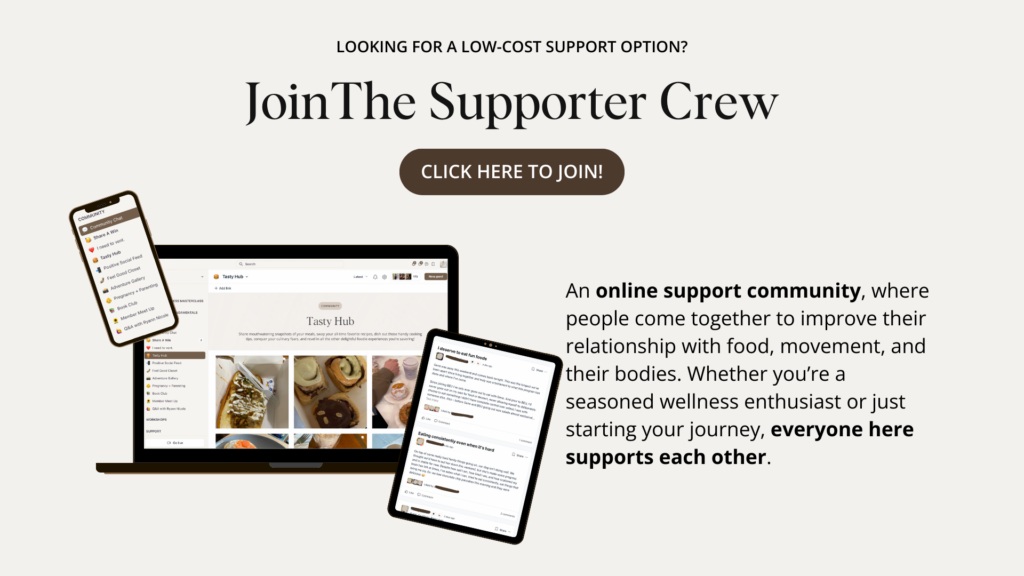Understanding and Overcoming Mental Food Restriction

Written By:
Category:
Ryann Nicole
Have you ever found yourself constantly thinking about food, even when you’re not hungry? Do you feel like you’re eating enough, but still feel out of control or anxious around food? If so, you might be experiencing what’s known as mental food restriction.
In this blog post, we’ll delve into the concept of mental food restriction, exploring what it means, why it happens, and most importantly, how to overcome it. Whether you’re struggling with food obsessions, feeling out of control around food, or constantly battling feelings of anxiety related to eating, understanding mental food restriction can be a crucial step towards finding peace and balance in your relationship with food.
What Is Mental Food Restriction?
Mental restriction involves any negative thoughts or feelings you have while eating, before eating, or after eating. It can be feelings of judgment, shame, fear, or anxiety about food. You might experience mental restriction when you want to eat something but tell yourself you shouldn’t because:
- You’re not hungry.
- You don’t think you need it.
- You believe it’s not good for you.
Unlike physical restriction, where you might limit what you eat, with mental restriction, you might be physically eating all kinds of foods. However, you’re still restricting yourself mentally. For example, you might:
- Not allow yourself to eat as much as you actually need because your mind says it’s too much.
- Avoid eating the foods you truly want because your mind says they’re bad choices.
- Fail to enjoy your food because your mind keeps criticizing and shaming you.
Even if you’ve stopped physically restricting your food intake, mental restriction can still make you feel compulsive and out-of-control around food. That’s why you might still struggle with food even if you’re eating more variety or quantity.
How Mental Restriction Shows Up
Mental restriction can show up in different ways. We might sort foods into “good” or “bad” categories, feeling bad about eating our favorites. We might always think about how many calories we eat, which makes us worried and guilty. Some of us make strict rules about when we should eat, even if we’re not hungry. Others attach rules to food, like thinking we can only eat after exercising. Sometimes, we use food to reward or punish ourselves based on our feelings, but that’s not a healthy way to relate to food.

Breaking Out of Mental Food Restriction
If you have been engaging in mental restriction for a while, breaking free from it will take time. However, it is entirely possible to overcome it! Here is what you can start working on to begin the process:
Awareness:
Start by noticing any negative thoughts you have about food or your body. These thoughts might include feeling guilty about eating certain foods or criticizing your appearance. For example, if you catch yourself thinking, “I shouldn’t eat this cake because it will make me gain weight,” that’s a negative thought related to food.
Questioning:
Once you’re aware of these negative thoughts, ask yourself if they’re based on facts or just assumptions. Challenge whether they’re really true or not. For instance, if you think, “I’ll always be overweight because I can’t control my eating,” question whether that’s really a fact or just a belief you’ve developed over time.
Alternative Perspectives:
Try to see things from a more positive point of view. Instead of focusing on what you think you shouldn’t eat, consider what foods might nourish your body and make you feel good. For example, if you’re tempted to skip a meal because you feel guilty, remind yourself that eating regular, balanced meals is important for your health.
Evidence Gathering:
Look for evidence that contradicts your negative thoughts. This could be examples from your own life or from other people’s experiences. For instance, if you believe that eating carbs always leads to weight gain, look for instances where people have successfully maintained a healthy weight while including carbs in their diet.
Realistic Evaluation:
Finally, assess whether your thoughts are fair to yourself. Ask yourself if you’re being too hard on yourself or if there’s a more realistic way to look at the situation. For example, instead of beating yourself up for indulging in a treat, remind yourself that it’s okay to enjoy food in moderation and that one indulgence won’t derail your progress.
By following these steps, you can begin to challenge and change the negative thoughts and beliefs that contribute to mental food restriction, leading to a healthier relationship with food and your body.
Keep Reading
Sharing the Truth About Emotional Eating: Debunking Myths and Finding Peace
Beating the Winter Blues: Your Ultimate Mood-Boosting Guide
Mastering Responses to Weight-Related Comments With Boundaries
Ryann Nicole
Licensed Therapist, Certified Nutritionist, and Virtual Wellness Coach
Ryann is a licensed therapist and virtual wellness coach who has assisted individuals worldwide in establishing a healthier relationship with food and their bodies.
Are You Ready to Heal Your Relationship With Food?
I understand—it can be overwhelming to figure out where to begin. Let's simplify things and have you start right here:
Why Am I Overeating?
First Steps To Stop Binge Eating
The Food Freedom Lab Podcast
FREE QUIZ
FREE GUIDE
Podcast
the food freedom lab podcast


